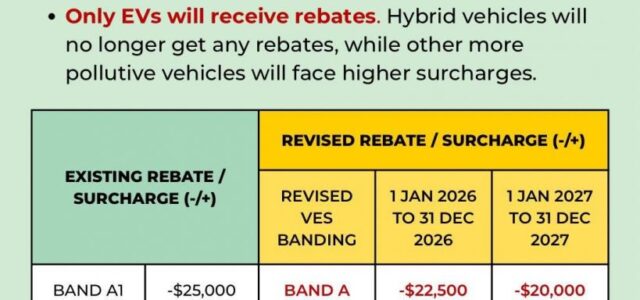Singapore extends EV incentives, with revised rebates and surcharges from 2026
singapore-extends-ev-incentives-with-revised-rebates-and-surcharges-from-2026
#Singapore #extends #incentives #revised #rebates #surcharges,
SINGAPORE: Singapore is taking its next big step towards greener roads. According to the Land Transport Authority (LTA), from 2026, the rules around car rebates will change again, this time placing electric vehicles (EVs) firmly in the driver’s seat, while hybrids slowly lose their advantage. It’s part of the government’s wider push for 100% cleaner-energy vehicles by 2040, on the road to achieving net-zero emissions by 2050.
What’s changing from 2026
The Vehicular Emissions Scheme (VES), which rewards buyers of cleaner cars with rebates, will be extended for another two years until the end of 2027. However, unlike today, only EVs will qualify for those rebates. Hybrid vehicles will no longer get the same perks, while more pollutive cars will face heavier penalties. That means for many buyers, the real choice moving forward will be between petrol and fully electric.

The Electric Vehicle Early Adoption Incentive (EEAI), first launched to encourage early EV take-up, will also stay in place for one more year until December 2026. However, the benefits will shrink as they will be capped at S$7,500 instead of the current S$15,000. After that, the scheme will cease entirely, as authorities believe EVs are reaching a tipping point where subsidies are no longer needed to close the price gap with traditional cars.

Still, the savings are nothing to sneeze at. Even with the changes, a buyer registering an EV in 2026 can still enjoy up to S$30,000 in combined cost reductions, while those buying in 2027 could see savings of up to S$20,000. Moreover, the S$0 Additional Registration Fee floor for EVs will also remain until the end of 2027, which will hopefully encourage even more people to opt into EVs compared to other models.

Why this matters to everyday drivers
For car buyers, these policy tweaks are more than just numbers, because they affect how people make real-life choices in showrooms. Until now, hybrids offered a middle ground, which is that they are supposedly cleaner than petrol, but without the higher upfront cost of EVs. However, with rebates removed for hybrids, that “halfway” option becomes less attractive, nudging drivers to consider taking the full leap into electric.
For the average family, the shift could eventually translate into cleaner, quieter streets and less tailpipe pollution, but in the short term, there may be a squeeze. The Land Transport Authority (LTA) has already warned that Certificate of Entitlement (COE) prices could spike as buyers rush to secure EV rebates while they are still relatively generous. That means anyone weighing a car purchase in the next year or two will have to think carefully about timing.
What netizens are saying
Online, reactions to the announcement were mixed. While some welcomed the continued support for EV adoption, others were quick to point out that cost would still be a huge problem. One blunt comment summed up the frustration: “If we need these kinds of schemes to buy cars, it means the cars are too expensive.”
Many also turned their attention to the long-term financial burden of owning an EV, particularly road tax. Several netizens repeated the same complaint: that EV road tax is currently higher than for petrol cars. One wrote: “EV road tax is crazy. Promote cleaner energy vehicles, but recover lost fuel revenue. So your EV adoption is actually a fail.” Another echoed the sentiment almost word for word: “I don’t understand why road tax for EVs is higher than petrol cars…”
The sentiment was also captured in shorter remarks like “Road tax is a killer!” and “Kindly consider lowering EV Road Tax too.” These comments show that while rebates may soften the upfront blow, Singaporeans remain wary of whether the long-term bills will add up. For many, owning an EV still feels like a costly commitment rather than an obvious upgrade.
The bigger picture
Despite the debate, the trend is clear. According to the LTA, between January and August this year, “80% of newly registered cars and taxis were cleaner energy models with about half being electric models”. That marks a major shift: EVs are no longer just the plaything of early adopters but increasingly part of the mainstream.
This gradual phasing out of these incentives shows that the government is confident that EV adoption will be strong enough to stand on its own in the future. The rebates and surcharges announced today aren’t just about numbers; they are tools to guide consumer behaviour, push greener choices, and keep Singapore on track for its 2040 goal.
In the end, the road ahead is clear: the future is electric, but as the comments online show, how fast Singaporeans embrace that future will depend not just on rebates, but on whether EV ownership feels financially sustainable for the everyday driver.
Read also: SMRT, RSAF share insights on AI and predictive analytics in safety and maintenance
